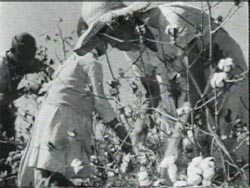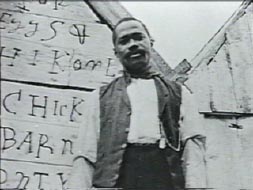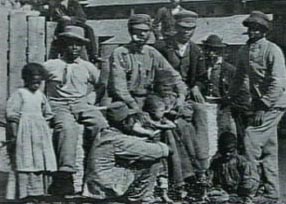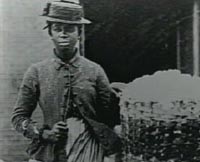After the Civil War, many southern blacks sought wealth and economic security by acquiring land and becoming independent farmers. Many of those who could not buy land became sharecroppers and tenant farmers on land owned by whites—a significant improvement over bondage, but far short of economic independence. Despite an abundance of racial hatred and their lack of schooling, blacks steadily increased their ownership of farm acreage after the Civil War until just before World War I. The late 1800s and early 1900s were rocky times for all Southern farmers. Cotton prices fell dramatically through 1900, rose until the end of World War I, and then declined precipitously through the Depression. Drought and the boll weevil piled further misery. African American farmers, tenants, and sharecroppers experienced all these problems, along with racial discrimination, which restricted their access to capital and commodity markets. Many blacks lost their farms in the 1930s through foreclosure and tax sales, and sometimes chicanery, which forced even those who wanted to remain on the land to migrate. The economics of mechanization further reduced the ranks of small farmers. Homecoming notes that the federal government's allotment and loan policies often resulted in blacks' losing their land. The Department of Agriculture and the Farm Home Administration, for example, often put into effect schemes that were a disadvantage to black farmers, either by directly discriminating against them or by covertly turning a blind eye to their plight.
Along with this historical narrative of African Americans and agriculture, Gilbert interweaves her story and that of her cousin, Warren James. Soon after Gilbert's birth her family moved north, but she returned periodically to spend time with her Georgia relatives. One of her earliest memories is of playing in the red dirt, and even bringing some of it back to her home in Pennsylvania. Of her Georgia relatives, the film concentrates on her cousin Warren James, who remained in Macon County, Georgia, and is now a middle-class cotton grower. He is educated, skilled, and works long hours to maintain his family farm. Like all such farmers, he faces uncertain commodity prices in a global economy, along with high operating costs, equipment failures, problematic financing, an uncertain labor supply, changing governmental policies, and the vagaries of the weather. As many small farmers have been forced to do, he has a second job to help support his family and farm. In spite of adversity, he remains firmly attached to his land and his extended family. It is his connection to community, family, and place that Gilbert admires and documents. Although she is only an occasional visitor to James's farm, Gilbert tries to recreate a small portion of its essence by cultivating a small garden plot in the city.
Although some may feel that Homecoming romanticizes the rural experience, the film is well executed, eminently viewable, and provides an artistically assembled overview of how newly liberated slaves sought freedom through land ownership, as well as how they acquired and lost farm acreage. It also dramatizes the current travails of African American farmers. Gilbert's historical narrative presents little that is new to those familiar with the existing scholarship on black land ownership and the Great Migration, but for those who are less familiar with the subject, the film offers a bouquet of visual images underscoring the themes documented by Pete Daniel, Marsha Darling, Gilbert Fite, Charles Flynn, John Hope Franklin, Neil McMillen, Gavin Wright, and others. In its brief fifty-six minutes Homecoming tries to address a number of themes: the historical pattern of African American farm ownership for the past 150 years and its marked decline in the twentieth century; the subjective meaning given to land holding by African Americans and its relationship to their consciousness of family and community; the problems of contemporary black farmers; Gilbert's self-identity and her "memories of red dirt and clay." The multiplicity of themes makes for interesting viewing but compromises the film's impact and somewhat reduces its pedagogical value. I was left wishing for a less complicated storyline, and a more in-depth treatment of the issues Gilbert raises. She does not distinguish clearly enough, for example, between the trends that affected all small farms in the South, and those factors that were singular to black farmers. Falling commodity prices, restricted capital markets, adverse weather, and the high cost of mechanization often resulted in farm-to-city migration for both African American and white farmers. On the other hand, Jim Crow legislation and the bigoted implementation of governmental policies exacerbated those problems for black farmers.
As a tool for classroom instruction, Homecoming would have been more effective, in my view, as two different films. The first would have focused exclusively on the historical relationships of African Americans to agriculture, emphasizing the legacy of slavery, the rise and decline of black ownership of land, the role of state and federal agricultural policies, and the importance of discrimination in both capital and labor markets. While Gilbert touches upon all of these topics, and more, she does not treat them in detail. The second film would have focused on contemporary issues of the disruption of family and community as a consequence of leaving or being driven off Southern farms.
E.M. Beck Copyright © 2000, 2001 by The Journal for MultiMedia History Comments | JMMH Contents |





